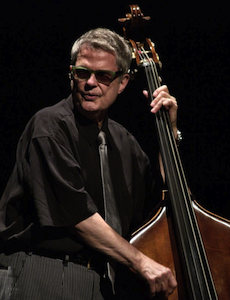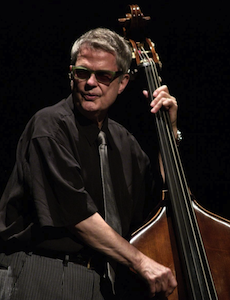
In three interviews over three decades, I’ve learned to appreciate Charlie Haden’s verbal expression, often as compelling and sincere as the sound of his acoustic bass. Long before I met him, over dinner with our wives in Los Angeles, I’d been entranced with Haden’s playing on the 1959 Atlantic LP The Shape of Jazz to Come and on other recordings by visionary saxophonist/composer Ornette Coleman, with whom Haden was closely associated until 1971.
“I try as much as I can to stress the importance of getting a deep, full sound out of your instrument,” Haden confirmed during our first talk, in 1990. “Because to discover your own sound and your own voice is no small feat. Every great musician in the history of jazz, their greatness came from their sound and their concept. And one of the things that’s so wonderful is that they were able to cause their instrument to sound exactly the way they were hearing, just like a fingerprint.”
Coleman, Haden, and their band members stunned the rest of the mid-20th century jazz world with passionate original music beyond accepted compositional structures and harmonic relationships. Now, in his 75th year, Haden has finally been receiving institutional recognition of his own greatness, including a Lifetime Achievement Grammy and designation as a Jazz Master by the National Endowment for the Arts. This coming weekend, he’ll also be the subject of a two-day tribute as part of the Healdsburg Jazz Festival, with which he’s appeared four previous times since its founding in 1999 by impresaria and jeweler Jessica Felix.
“It’s gonna be a family affair, and it’s gonna be great,” Haden promises in our latest chat last week, noting that aside from his two ongoing ensembles — the Liberation Music Orchestra and the Quartet West — and a host of adoring jazz stars, the Tribute will feature Haden’s triplet daughters (Petra, Rachel, and Tanya) and his son Josh, all of them musicians.
Health Crisis
Haden hopes to deploy his bass as much as possible through all this. But it would be his first public performance in two years, since he started suffering a rare instance of post-polio syndrome, which has sapped his energy, affected his speech, and taken him off solid food. “The doctors don’t know much about it,” he laments, except that it’s an unexpected reprise of the mild case of polio which put an end to his childhood singing career when he was 15.
Since this condition has limited the interview process, I’m also making use here of our two previous interviews, as well as input from 41-year-old Petra, who tells me, “I’ve visited him recently, and when he’s playing, that’s when he’s at his strongest and best, it just looks like he’s in heaven.”
For their part of the tribute’s second day, this Sunday, Petra and her sisters, with backing from their brother, will showcase a music markedly different from Coleman's, but which dates back much earlier in their dad's life, before the polio and the jazz. It’s what’s sometimes called Old Timey, the antecedent of Bluegrass and Country music, and it abounded in the Midwest and Prairie states where young Charlie was raised by Carl and Virginia Haden, veterans of the Grand Ole Opry.
“As each child was born, we were added onto the Haden Family group,” recalls Haden. “We were real close friends with the Carter Family, and my father was very close with the Delmore Brothers. We traveled all over the Midwest, on various radio stations, and then we moved to Missouri and we broadcast from our farmhouse living room. We had cows and chickens and horses and crops, and everybody did chores before we did our radio show, which opened with a theme song, ‘Keep On the Sunny Side’,” a hit for the Carters, whose daughter June would end up marrying Johnny Cash.
The radio served young Charlie as a source of other kinds of music, including classical and big band jazz. “My influences were the composers I felt close to: Bach, for instance, Ravel, Shostakovich, Rachmaninov, and Bartok. They provided inspiration and hope.” He’d sneak into his older brother Jim’s room to play his bass and his jazz records. “To me, the bass sound was the whole foundation of harmony. I taught myself to read music.”
Hanging out as a teen with country musicians touring through Missouri, Haden realized that, “Hillbilly music is really close to jazz, because there’s lots of improvisation. And country music was an asset to me [in jazz], because. my family really stressed having perfect ears, and if anyone was flat or sharp, they heard about it.”
Search for a Musical Soulmate
But it was a jazz program that lured Haden away from Missouri to the Westlake College of Modern Music in Los Angeles, rather than to the Oberlin Conservatory, to which he’d also been accepted. Still stronger was the influence of jam sessions at various Hollywood clubs, which resulted in Haden’s dropping out after his first semester to back such local legends as Art Pepper and Hampton Hawes. But, “After playing and respecting the jazz tradition and the chord changes, learning all the tunes and loving it, I found myself hearing another way to improvise which wasn’t on the chord changes. And every time I tried to do this, musicians might become very upset with me, because they wouldn’t know where [in the song] I was.”
He finally found a soulmate in a somewhat older African-American from Fort Worth who worked a day job operating an elevator at Bullock’s department store and moonlighted on a plastic saxophone. “My whole life lit up from the sound,” Haden recalls about his first exposure to Ornette Coleman. “It was like a human voice. He improvised with a desperate urgency to create something that had never been before.” The 20-year-old bassist brought his instrument over to the saxophonist’s one-room apartment, where, “It was the first time ever I felt like the handcuffs were taken off. He would play a note that was the tone center of a certain phrase, and I would go to that tone center and make it a change. And from the different intervals that we were playing together, we created our own journey. What a journey!”
“Every great musician in the history of jazz, their greatness came from their sound and their concept. And one of the things that’s so wonderful is that they were able to cause their instrument to sound exactly the way they were hearing, just like a fingerprint.” - Charlie Haden
Coleman’s first working quartet was formed with Haden, Don Cherry on trumpet, and Billy Higgins on drums. In 1959, they got a recording date with Atlantic Records and an extended gig at the Five Spot in New York, and folks started to listen, among them one of the Big Apple’s favorite sons. Out of modesty, “I always close my eyes when I play”, relates Haden. “And one night this guy puts his head to the f-hole of my bass, and I opened my eyes and said, ‘Get this guy off the stage!’. The other guys said, ‘That’s Leonard Bernstein!’, and I said, ‘Who’s Leonard Bernstein?’.” After a proper introduction, the conductor and composer “started coming down there every night with a limousine, and he’d invite us to his table and to hear Philharmonic rehearsals. Then he was a recommendation for me to get a Guggenheim Fellowship in composition.”
Hard Work and Perfect Pitch
In L.A., Haden had shared the “fairly common” experiment of his peers with heroin. But in New York, his indulgence resulted in the suspension of the cabaret card he needed to work, and it then put him in rehab programs in Missouri, Texas, and L.A., and at Synanon and Delancey Street in San Francisco. He succeeded in kicking the habit and went on to perform and record hundreds of albums over the next several decades with a variety of luminaries from jazz and other genres such as blues, Portuguese fado, and Brazilian avant garde.
Haden founded the Liberation Music Orchestra to create music around themes based in his activist politics, with composer, arranger, and keyboardist Carla Bley remaining a staple of the changing group over several decades. (Bley will appear with the LMO on the tribute’s second day, along with such younger players as Chris Potter, Matt Wilson, and Bill Frisell). Quartet West (to be featured on the tribute’s first day) became a vehicle for Haden’s nostalgic evocation of ‘50s film noir. Settling in LA to be near his kids (he’d separated from his first wife, Ellen), Haden started teaching at the California Institute for the Arts, where he initiated its jazz department and recruited major players as faculty.
The Haden triplets studied classical music, with Petra beginning violin at age seven, after witnessing a child prodigy’s performance of The Flight of the Bumblebee. “Rachel played piano, and Tanya played cello, so we were a perfect trio,” says Petra. “I remember practicing with my dad, and he would make me laugh. I don’t have to be perfect, all I want to do is the best I can do, and that’s what he taught me.” This year’s Petra Goes to the Movies (ANTI Records) displays the benefits of both classical training and genetic perfect pitch: Petra covers all orchestral parts of her arrangements of classic movie themes and cues by multitracking her own voice, without any instrumentation (except for her dad, Bill Frisell, and Brad Mehldau on bass, guitar, and piano, respectively).
“I remember practicing with my dad, and he would make me laugh. I don’t have to be perfect, all I want to do is the best I can do, and that’s what he taught me.” - Petra Haden
Papa Haden had taken care to nourish his offspring from his own cultural and musical roots. “We used to visit our dad’s family in Missouri,” remembers Petra, “and we used to sing in the living room there, with our uncle, our aunt, and our grandma Virginia, Carter Family songs and other songs.” In 2008, Haden surprised some of his longtime jazz fans by releasing Rambling Boy on Decca, with a profusion of Old Timey and Country songs, vocalized and performed by Josh, Petra, Rachel, Tanya, Tanya’s actor/singer husband Jack Black, Haden’s second wife Ruth Cameron, two-year-old “Little Cowboy Charlie” himself (on a historical track), and a roundup of country, bluegrass, pop, and jazz celebrity guests who appreciated the chance to work with Haden on genuine material. “Most of the new country people, though that’s what they call them, are pop,” Haden advises. “It’s not really country music.”
But what the sisters and their brother will be showcasing for this weekend’s tribute is real Americana. After working separately and together in a variety of contemporary groups (including the Decembrists), The Haden Triplets, are now recording their own album celebrating their roots legacy, on Nashville-based Third Man Records. They’ll be showcasing some of these songs on Sunday at the Jackson Theater in Santa Rosa, accompanied by Frisell and, they hope, their father, depending on his health.
Haden appreciates the recognition late in his career, and is looking forward to another career award later this year in the Ukraine. “Ruth is taking care of me, and on that trip we’ll also be going to an acupuncturist in Germany,” to treat his post-polio afflictions. In the meantime, Haden welcomes a team effort by fans and colleagues to trigger the sort of financial support which doesn’t always come with awards. “You can write letters and say, here’s a lifetime achievement musician whose life is going away, so please help him,” he advises. If you want to help with suggestions or outreach, contact Ruth Cameron at [email protected].

